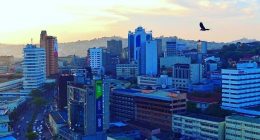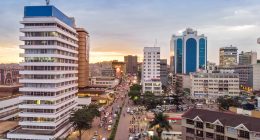Former U.S. president Jimmy Carter in his book Our Endangered Values: America’s Moral Crisis called it “the world’s greatest challenge in the new millennium”. World leaders, celebrities, the pope and clergy have also weighed in. It turns out the greatest challenge to humanity today is not terrorism (think Al Shabaab, ISIS, or Boko Haram); not global warming or increasing nuclear proliferation, it is the growing global income inequality and poverty.
Society is increasingly becoming divided, not necessarily between blacks, whites or Muslims and Christians, but primarily between the rich and poor. And this is a threat to the very future of humanity seeing that income inequality can be the catalyst to insecurity, terrorism and mayhem because an increasingly significant portion of the global population feels left out of the global economic system.
Tracing the roots of inequality
At the beginning of the 20th century the richest 10 countries were 9 times wealthier than the 10 poorest ones. By 1960 this ratio was 30:1, and by the turn of the 21st century the average person in the 20 richest nations earned 131 times more than the average person in the 20 poorest countries. The chasm, as a result of the global economic system; advances in technology, continues to grow. Nowhere in the world has the impact of poverty and inequality been felt hardest than in developing nations in the global south–what economist Paul Collier calls the “bottom billion”.
At the beginning of the 20th century the richest 10 countries were 9 times wealthier than the 10 poorest ones.
Whereas Africa over the last twenty years has enjoyed rapid economic growth, an improvement in democracy and, as a result, increased foreign investment mainly directed towards it’s commodities and natural resources. It has also experienced an unprecedented concentration of wealth in the hands of a few elites–the nouveau riche–at the expense of the poor.
The average per capita income of an African today is actually lower than it was in 1970, this despite the continent having more than half of the world’s fastest growing economies. Countries like Angola despite enjoying rapid economic growth over the last decade still grapple with issues of governance, inadequate health care for the citizens and high levels of poverty. The Africa “rising” mantra seems to have failed to transit beyond the air conditioned offices in Luanda, Nairobi and Abidjan to the rural masses that make up the bulk of Africa’s population.
However, all is not lost for Africa. The continent has, in its young people, its greatest asset. The youthful potential of the continent’s young population is what will drive us and, hopefully, the rest of humanity to a fairer, just and equal world. I see this in the faces of many young Africans that I meet, at conferences, in discussions on social media and at Universities like Makerere.
However, for this youthful potential to be fully harnessed we need to do the following:
Increase development assistance to the world’s poorest regions
Philanthropists like former U.S. president Jimmy Carter, singers Bono and Bob Geldoff have argued for increased development assistance, forgiveness of debt for the poorest nations, etc, in the past. And they have received their own fair share of criticism from proponents of “Trade not Aid”, some of it deserved. I would argue, in addition to compassion, the rest of the ‘better off’ world should act in other ways to try and stem the problem of world poverty and inequality. We should see more efforts in the West to bring to book corporations which fuel conflict in the poor parts of the world, more stringent legislation against tax avoidance by multinationals, especially those in the extractive sector–which is the primary source of taxes for most African governments. According to a recent report Africa has lost at least $1 trillion in the last 50 years in illicit financial outflows, including tax avoidance, mainly by foreign multinationals.
Empower the citizen
Despite having 653 elections between 1960 and 2010, 354 of which were presidential, citizens in most African countries are not empowered enough to hold those entrusted with power to account. Leaders and their cabal of fortune-seekers are able to get away with unethical conduct, corruption and abuse of office without drawing public condemnation because the citizens have been brought up to settle for less. Such impunity is at the root of growing inequality in Africa. Jeffrey Sachs in an article for Project Syndicate puts it better, “the ability of those who wield great public and private power to flout the law and ethical norms for personal gain is one of the more glaring manifestations of inequality”. The result of all this–a very powerful minority and a dis-empowered citizen majority–is an “impunity trap” where even the smallest attempt at equality and social justice is sneered at by those it is most likely to help, the citizens, because they feel impunity is the new norm.
However, with an empowered, informed and determined young citizenry we can reverse this impunity trap. Social media has opened up new avenues through which the citizen can directly interact with those entrusted with authority and ask the hard questions. We have tried this at Makerere University with Vote Issues and we are quite sure the idea can be spread to other institutions, including government. Which is why am very excited for ideas like these ones to find a place like the Global Students’ Dialogue, where they can be discussed by the most enlightened of young minds from Uganda, the continent and the rest of the world. Today’s complex global challenges can only be solved through engagement of future leaders, now students in universities, to devise creative and actionable solutions that will result in a more prosperous, fairer and equal globe for posterity.
The above article was part of the conversation leading up to the Global Students Dialogue organized by the LéO Africa Forum at Makerere University, July 4, 2015.







